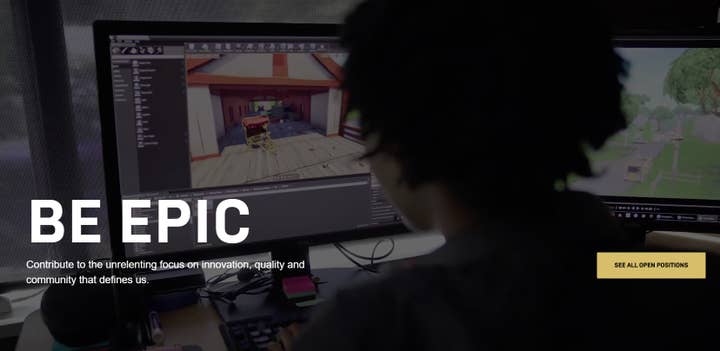United devs stand, divided they crunch | Opinion
Management doesn't need to mandate excessive overtime when it has developers policing each other
When talking to developers about their experiences with crunch, it often gets depressing. You hear a lot of stories about horrible bosses, hostile workplaces, and how the games people love to play are so often the result of tremendous suffering.
But the saddest part of these stories for me has been hearing these developers describe the love they have for their co-workers, and how their employers manipulated that love to make them hurt one another. Here are a few general statements I'm confident in making after reading entirely too many exposés and speaking with dozens of developers at a variety of studios about their experiences:
Everybody wants to make a great game.
Nobody wants to let their co-workers down.
These are nearly ubiquitous in the industry, and they also happen to be some of the fundamental building blocks of crunch culture. When people are passionate -- there's that word again -- about their jobs, they're going to push themselves to make something great. When like-minded people spend years of their lives working toward a common goal, they're going to develop bonds with some of them. They won't want to let the team down.
"They loved to be ambiguous and not actually give a set number of hours to start, as well; just leaving it up to people to do themselves"
A former Rockstar developer
That's all well and good so far, but you can probably see how these traits can be easily leveraged by employers to create a culture of crunch, one where employees apply the pressure to crunch on themselves and each other, where management can effectively drive its workforce into the ground while maintaining plausible deniability because it was never explicitly mandated.
As one former Rockstar employee told us: "Even if they didn't flat out say the words 'required' and 'mandatory', they would say things like 'we need to start working more hours' and 'we're going to have to start ramping things up'... They loved to be ambiguous and not actually give a set number of hours to start, as well; just leaving it up to people to do themselves."
Or look at Epic Games, which doesn't have mandatory overtime and offers its employees unlimited time off. Those employees know how much work there is to do, and may even take less time off than they would in a more defined vacation plan rather than let that work fall to their colleagues. Or maybe they're afraid that taking the time off will have a negative impact on their career progression, or even their continued employment. In any case, Epic gets to have its crunch and deny it, too.
Or NetherRealm, where one former worker explained: "Your coworkers would make fun of you or look down on you if you didn't put in the hours." Another said that leaving at a reasonable hour was seen as evidence that you didn't care about the game.
Co-workers aren't the only ones pushing developers to crunch; players and the press are doing their part as well. In the games-as-a-service world, it's not enough to simply launch a hit game. Now it needs to be updated constantly, and then emergency patched to fix anything the update breaks. In between updates, we demand near-constant communication. (It's not necessarily AAA, but Kickstarter tells game developers they should be updating their backers every other day throughout development. For non-gaming projects, the rule of thumb is once a week. Gamers have been trained to expect this.)
Developers intolerant of crunch culture do not stay in crunching studios, which leads to a uniform acceptance of the practice among those who remain
In many ways, these external and internal pressures help ensure crunch culture is systemic and self-sustaining. When developers enter that sort of environment, many fall in line. Obviously, some do not. But those who don't accept such treatment don't last in these companies. They either burn out and are discarded, or they walk away in search of a better employer.
Typically, they are replaced by a steady stream of eager young talent that is either ignorant of what they are getting into, or decides the crunch is worth it for a position at a big AAA studio in the games industry. Those new recruits will be regaled with "war stories" of the crunch of previous years as if they were a badge of courage, as if they are being challenged to show they have the mettle for the task at hand. As with their predecessors, those recruits either buy into the culture or are eventually ejected from it, to be replaced by yet another generation of developers eager to get into games.
This creates a sort of survivorship bias, as the studio filters out anyone who sees the culture as unacceptable, as well as anyone unwilling or unable to make the sacrifices involved. The people who thrive in that environment will be the ones most compatible with the culture. They will be promoted and, in all likelihood, reinforce the same values on the developers now under them. (I have also heard plenty of stories of supervisors using what influence they have to shield their employees from harm, which is laudable but does little to fix systemic issues.)
And of course, the most senior people, the ones likely to comprise a management group and have the most influence over studio decision-making, will be the ones most comfortable with crunch. When they make decisions about, say, whether or not it's reasonable to have a NetherRealm team already months behind schedule take a few weeks to make a playable build for a marketing event while sticking to the original development plan, they are less likely to be concerned about the impact that decision will have on their staff.
Years ago, companies used to be a little more upfront about this sort of thing. Epic used to be fairly open about crunching its employees, with then-president Mike Capps saying in 2009 that anyone who wanted to work 40-hour weeks probably wasn't a good fit for the company. That was right after Gears of War 2 producer Rod Fergusson used his presentation at the Game Developers Conference to say that crunch is necessary, and something he enforced on the entire development team, even groups who were already on schedule.

These days there's more resistance to crunch and greater awareness of the toll it takes on developers, so companies are a little quieter about it. They don't want to reform their development practices and they still want to select for the people most compatible with crunch conditions, so they rely on dog-whistles. Epic's careers page talks about the company's "unrelenting" focus on innovation, quality and community. Rockstar's said that working at the studio "is about passion and commitment, to the projects and to each other," suggesting that the intense peer pressure to keep working mentioned above is a feature and not a bug.
This all may feel like it's just stating the obvious, but clearly plenty of people don't see it as such. There's no shortage of developers who have bought into crunch culture, who are actively participating in and perpetuating it, who are contributing to the harm their colleagues are suffering, intentionally or not.
When developers are the ones cracking the whip on each other, companies with horrible work cultures can frame their situation as driven developers pushing themselves rather than cruel employers burning their people to a husk. There's a plausible deniability that the company can use as a shield, and the developers can buy into as well.
"It took me years to get over the mentality that crunch is just a thing you do because that's how games are made," a former NetherRealm developer told me. "It wasn't until the higher ups at my current job sat me down and told me that my life is important that I ever changed the way I looked at things."
That crunch mentality is by no means rare at NetherRealm. As one current staffer said after criticisms of the conditions at the studio first surfaced: "Everyone in the studio is downplaying it... I'm against how everything's happened so far. But if I say anything, everyone's immediately going to look at me like I'm a fucking alien. The conversation isn't being had, and it's probably not going to."
There's little reason to think companies like NetherRealm will work to fix these problems when they won't even acknowledge they even have them. Maybe the steady drumbeat of horror stories and studio exposés -- does anyone doubt there are more on the way? -- will change their minds. And if they aren't willing to make changes from the top down, then it stands to reason that any improvements will need to come from the bottom up.
That might eventually mean unionization, but for that to happen, developers first need to understand the systemic pressures contributing to their crunch cultures, and to realize they deserve better.

